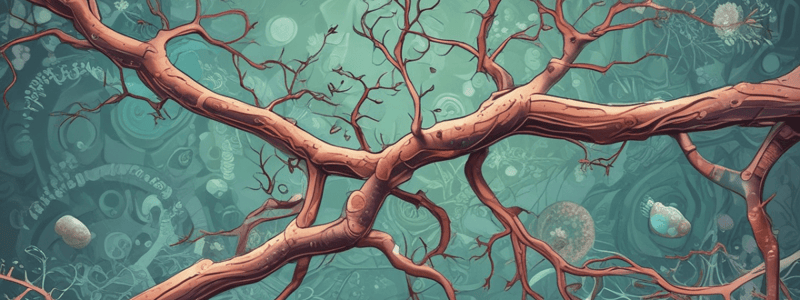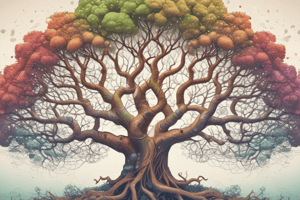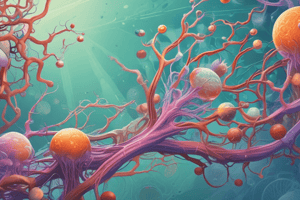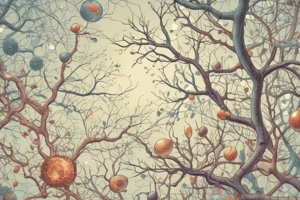Podcast
Questions and Answers
Which branch of biology studies the interactions between organisms and their environment?
Which branch of biology studies the interactions between organisms and their environment?
- Ecology (correct)
- Botany
- Zoology
- Genetics
What is the basic unit of life?
What is the basic unit of life?
- Tissue
- Cell (correct)
- Organ
- Organism
Which organelle is responsible for generating energy for the cell?
Which organelle is responsible for generating energy for the cell?
- Mitochondria (correct)
- Ribosomes
- Endoplasmic reticulum
- Nucleus
What is the process by which organisms with favorable traits are more likely to survive and reproduce?
What is the process by which organisms with favorable traits are more likely to survive and reproduce?
What are the non-living components of an ecosystem called?
What are the non-living components of an ecosystem called?
What is the genetic material that carries information from one generation to the next?
What is the genetic material that carries information from one generation to the next?
Which of the following is NOT a step in the scientific method?
Which of the following is NOT a step in the scientific method?
Which of these branches of biology focuses specifically on the study of plants?
Which of these branches of biology focuses specifically on the study of plants?
Flashcards are hidden until you start studying
Study Notes
Branches of Biology
- Botany: study of plants
- Zoology: study of animals
- Microbiology: study of microorganisms
- Ecology: study of interactions between organisms and their environment
- Genetics: study of heredity and variation
- Biochemistry: study of chemical processes in living organisms
- Biophysics: study of physical principles underlying biological processes
- Molecular Biology: study of biological processes at the molecular level
Cell Biology
- Cell: basic unit of life
- Cell membrane: semi-permeable membrane that separates cell from environment
- Cytoplasm: jelly-like substance inside cell membrane
- Nucleus: contains genetic material (DNA)
- Mitochondria: generates energy for cell through cellular respiration
- Endoplasmic reticulum: involved in protein synthesis and transport
- Ribosomes: site of protein synthesis
Evolution
- Theory of Evolution: explains how species change over time through natural selection
- Natural Selection: process by which organisms with favorable traits are more likely to survive and reproduce
- Speciation: process by which new species are formed
- Fossil Record: provides evidence of evolutionary history
- Comparative Anatomy: study of similarities and differences between body structures of different species
Ecosystems
- Ecosystem: community of living and non-living components interacting in an environment
- Biotic Factors: living components (plants, animals, microorganisms)
- Abiotic Factors: non-living components (light, temperature, water, soil)
- Energy Flow: energy is transferred from one trophic level to the next through food chains and webs
- Nutrient Cycles: nutrients are recycled through ecosystems
Genetics
- DNA: genetic material that carries information from one generation to the next
- Genes: segments of DNA that code for specific traits
- Traits: characteristics of an organism determined by genes
- Inheritance: passing of traits from parents to offspring
- Mutations: changes in DNA sequence that can result in new traits
Scientific Methods in Biology
- Observation: making observations of biological phenomena
- Question: asking a question about the observation
- Hypothesis: proposed explanation for the observation
- Experiment: testing of the hypothesis
- Data Analysis: interpretation of data collected during the experiment
- Conclusion: drawing a conclusion based on the results of the experiment
Branches of Biology
- Botany focuses on the study of plants, their structure, function, and roles in the ecosystem.
- Zoology is dedicated to understanding animal behavior, physiology, and classification.
- Microbiology examines microorganisms, including bacteria, viruses, fungi, and protozoa.
- Ecology investigates the interactions between organisms and their environment, emphasizing ecosystem dynamics.
- Genetics explores heredity, variation, and the molecular mechanisms of trait inheritance.
- Biochemistry delves into the chemical processes that occur within living organisms, such as metabolic pathways.
- Biophysics applies the principles of physics to understand biological systems and processes.
- Molecular Biology studies the interactions of cellular processes at the molecular level, including DNA, RNA, and protein synthesis.
Cell Biology
- A cell is recognized as the fundamental unit of life, organizing biological functions and processes.
- The cell membrane acts as a selective barrier, controlling the passage of substances in and out of the cell.
- Cytoplasm consists of a gel-like fluid that fills the cell and houses organelles.
- The nucleus serves as the control center, housing genetic material (DNA) and regulating cellular activities.
- Mitochondria are the "powerhouses" of the cell, converting nutrients into energy through cellular respiration.
- The endoplasmic reticulum has two forms: rough (with ribosomes) for protein synthesis and smooth for lipid synthesis and transport.
- Ribosomes are the sites where amino acids are assembled into proteins, crucial for cellular function.
Evolution
- The Theory of Evolution posits that species evolve over time through the process of natural selection.
- Natural selection selects for organisms with advantageous traits, increasing their chances of survival and reproduction.
- Speciation occurs when populations become genetically distinct, leading to the emergence of new species.
- The Fossil Record serves as historical evidence of the gradual changes in species over time.
- Comparative anatomy reveals evolutionary relationships by examining structural similarities and differences among species.
Ecosystems
- An ecosystem encompasses both living (biotic) and non-living (abiotic) components interacting in a specific environment.
- Biotic factors include all organisms, such as plants, animals, and microorganisms that influence the ecosystem.
- Abiotic factors encompass non-living elements like light, temperature, water, and soil that affect living organisms.
- Energy flow demonstrates how energy moves through food chains and webs, linking different trophic levels from producers to consumers.
- Nutrient cycles, such as carbon and nitrogen cycles, describe the recycling of essential nutrients within ecosystems.
Genetics
- DNA is the fundamental genetic material that stores and transmits hereditary information across generations.
- Genes are specific sequences of DNA that direct the development of particular traits in organisms.
- Traits are observable characteristics that result from the expression of genes, influenced by both genetic and environmental factors.
- Inheritance refers to the mechanism by which traits are passed from parents to their offspring, following Mendelian principles.
- Mutations are alterations in DNA sequences that can lead to new traits, potentially affecting the fitness of an organism.
Scientific Methods in Biology
- Observation involves the careful examination of biological phenomena to gather data.
- A question arises from observations, guiding the research process in biology.
- A hypothesis is a testable statement providing a potential explanation for the observed phenomena.
- Experiments are conducted to test the validity of the hypothesis under controlled conditions.
- Data analysis encompasses the evaluation of collected data to determine trends and relationships.
- Conclusions are drawn based on the experimental results, informing future research and understanding in biology.
Studying That Suits You
Use AI to generate personalized quizzes and flashcards to suit your learning preferences.




